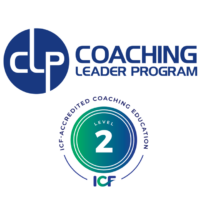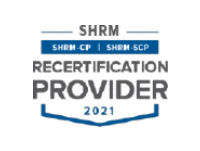
Coaching as a practice, a skill and a management technique
GroupWorks’ Coaching Leader Program ( CLP) provides a multi-model research-based approach to coaching. We teach and certify individual professionals who want to expand who they are, elevate what they accomplish, and amplify the contribution they bring to the world.
Video Testimonials


-Parul, PCC, Executive Coach, Communication Professional
Why CLP?
The CLP is a scholarly, research-based program designed to strengthen participants’ coaching skill–set and expand their toolkit. Learn how personal transformation occurs using your own experiences and reflections. Use coaching as a practice, a skill, and as a management technique.
We are accredited by the ICF at the ACTP level which means that we provide all of the training, observation and feedback needs that the ICF requires for coaching certification at the PCC and ACC level. We also provide a number of opportunities to increase your independent coaching hours through peer groups and at times non- profit and University opportunities.
The Coaching Leader Program is designed as an academically sound yet practical program, with faculty who are all scholar- practitioners, experienced professors and professional coaches with years of experience developing and curating research-based practices and teaching executives and students.
Most programs base their coach training on one model. Our program is unique by focusing on multiple models and on all elements that are shown to increase your coaching competence particularly with leaders in a business setting.
Schedule
September – December 2024
All classes for the Fall 2024 Coaching Leader Program will be delivered virtually and in English.
Practice sessions (2-hour coaching practice sessions) and webinars (2- hour microsessions) are in a flexible format. Practice sessions can be adjusted to fit your schedule and webinars can be attended virtually in real time or viewed online.
Testimonials
After spending 30 years as a Human Resources executive, I have been fortunate to be able to reinvent myself, and coaching has been such a rewarding choice. The CLP training, support from the program faculty and my cohort peers, as well as the certification credentials have paved the way for me to start a coaching business. The timing was right, and I was able to double my revenue projections in the very first year! I am so pleased to have made this decisionand I continue to refer my colleagues who are interested in certification to check this program out. It has everything that’s needed and more!
The CLP is a collaborative educational experience that proved to not only be a source of professional development but also personal development. I began this course with the intention of becoming certified and coaching clients yet I realized after the first session there was an immediate application for what I was learning-the principles of coaching could be used to have empowering and thought-provoking conversations with my staff. I would highly recommend this program to anyone interested in coaching or anyone interested in being a better leader for their team.
Taking the Coaching Leaders Program was something I did as a way to learn more about what it meant to be a professionally certified coach -what I actually learned was so much more profound. I am the coach I am today because of the CLP course…and the legendary coaches that taught us. If you are even remotely considering the pros/cons of taking CLP at SJU…you should talk to one of the previous students or the teaching faculty…it will make your decision easy
The CLP is a brilliantly constructed program with top-notch leadership and trainers. It is the best way to learn about yourself and the necessary coaching skills youneed to begin a career of coaching.
The program was great, and I thought I knew a lot more about coaching than I actually did prior to taking the course. I would highly recommend the program to others
CLP is a very worthwhile coach certification program. I value the range of tools, methods and frameworks represented. I also value the practical way in which the content and structure of the program unfolded. The diversity in the group supported the learning process and the continuous improvement orientation Felice espouses, makes all the difference. I use several aspects of the CLP in my executive and Board Director 1:1 coaching and my team coaching.
The specific framework taught in the Coaching Leader Program provides leaders with conversational agility and tact to elicit the best outcomes for both their clients and work groups.
CLP focuses on the whole person first, then as coach as the program proceeds. The faculty are experienced, professional coaches who are empathetic and enthusiastic in developing new and less experienced coaches. The program fosters camaraderie, which is largely sustained. Worthwhile and rewarding.
The CLP program prepares you for ICF coaching certification as well as providing a wide range of coaching skills and techniques. The thought put into the program is extensive and beneficial.
The Coaching Leader Program helped me to enhance many of the skills that I use in my current position, such as deep listening, clear communication, and empathetic understanding. The program also gave me insight as to how I might develop a new path for myself as a coach. Most importantly, the program taught me how ask the right questions to move forward in all aspects of my life. I would rank my completion of the CLP as one of my most important accomplishments.
The Coaching Leader Program has transformed my perspective on how to best serve my student and family clients. Through gaining additional insight about myself and learning strategies and tools for pulling out the most important issues in any conversation, the Coaching Leader Program has equipped me for even more success in business and in life.
Curriculum and Objectives
Coaching Leader Program Curriculum and Objectives
The CLP is organized in 5 modules delivered in 3 Weekends accompanied by 7 Micro Learning Webinars which can be attended in real time or on demand via the Library of On Demand Only videos.
In addition, each student will participate in 6 Group Practice Sessions with Mentor Coaches and 3 one-on-one sessions with a Mentor Coach.
Coaching Leader Program: A Step Beyond the traditional Coaching Curriculum
- De-mystify coaching and coaching presence into actionable steps.
- Identify and deepen key coaching skills, including active listening, powerful questioning, providing useful feedback, working through resistance, creating actionable goals, and empowering others.
- Explore how flexing coaching styles to fit different situations will maximize your impact as a coach.
- Create a unique coaching model, guidebook, and toolbox that you can use as a reference to inform your own coaching approach.
After completing this 125-hour program, you will be able to:
- Integrate adult learning principles into your coaching practice
- Unlock your creativity using powerful questions and systems thinking to help your client come up with innovative solutions to complex problems
- Apply a systems approach to coaching by helping clients analyze organizational cultures, build teams and work within their organizational structures
- Practice, review and recognize the underlying science of all the ICF Core Competencies*
- Make the connection between being a coach and being a coach leader.
Curriculum Elements Include:
- Emotional intelligence and competencies
- Gestalt methods for working through resistance
- Clinical psychology skills for coaching
- Research in neuropsychology and leadership
- Intentional conversation skills using tools like SAVI™ ( System for Analyzing Verbal Interaction)
- Mindfulness and Presence Activities
- Diversity and Inclusion using the DDM™ ( Diversity Development Model)
Foundations of Coaching covers coaching as both a practice and a leadership development methodology. Participants will practice foundational coaching skills including understanding and practical usage of the ICF Competencies and ethical guideline. We will differentiate coaching conversations, coaching skills and coaching engagements. Participants will explore the history and relationship of adult learning, leadership development and coaching.
Objectives Module 1
- Define coaching and distinguish coaching from other disciplines
- Differentiate between coaching skills and the coaching process
- Introduce the ICF Competencies and Ethical Guidelines
- Practice coaching conversations through active listening, questioning and positive client impact
- View coaching through the lens of adult learning
- Practice establishing a coaching agreement and creating a safe environment
- Discuss coaching cases by participating in Coaching Clinics with Mentors
Participants will define and take part in activities that will build coaching skills like coaching presence, powerful questioning and building trusting relationships.
Emotional Intelligence Competencies will be introduced as a leadership model for coaches to use with clients and as a practice to develop participant coaching competencies. We will introduce the arc of a coaching engagement including the introduction of assessments, feedback and interventions that serve the client.
Objectives:
- Discover how to use the Emotional Intelligence as a leadership model and coaching framework
- Practice using Emotional Intelligence competencies to develop self-management and social awareness (empathy)
- Experiment with the role of coach through the Person- Role skill
- Introduce and experiment with multiple assessment methods
- Define and experiment with coaching presence
- Practice designing actions and interventions using powerful questions, competency development, cognitive experiments
- Practice direct communication
- Continue to practice establishing a coaching agreement and creating a safe environment
- Discuss coaching cases with Mentors
Participants will be introduced to psychological theories and models that help coaches thrive in complex and diverse work environments. Transformation is examined through positive psychology. Approaches will include an introduction to the Systems Centered framework for communication theory using the System for Analyzing Verbal Interaction – SAVI™ model. Participants will practice goal setting and managing progress and accountability. Ethical Guidelines are again explored.
Objectives:
- Recognize the significance of change
- Practice using goal setting and problem-solving tools
- Discover the power of roles and goals in coaching relationships
- Become familiar with theory of personality
- Using resistance to change as a force of change
- Experiment with working with feelings
- Ethical issues that require calling in a specialist
- Communication using Systems Centered Theory (SCT)
- Practice coaching competencies at the PCC Level
The most powerful instrument we have in helping our people navigate change, is ourselves. Participants will experience the theory and application of the powerful Gestalt approach to coaching. Through a combination of readings, demonstration exercises, and practice, the participant will enhance their ability to make deeper contact with clients and utilize the Gestalt Cycle of Change to guide the coaching relationship. Focusing on various awareness lenses, such as embodied awareness and reflective awareness, the coach can heighten their use of self, the client’s awareness of self, their context, and the systems they work in.
Objectives:
- Review the history of Gestalt through a therapeutic OD and coaching lens
- Build awareness and use of Self
- Use the Gestalt model for contracting for experiments
- Identify the differences between Figure and Ground and apply to a coaching context
- Build powerful questions based on the Cycle of Experience
Participants will practice, discuss and create a map that integrates all of the models we covered and the ICF competencies. Deep discussion about ethical guidelines is central to this session as is building awareness of diversity and inclusion. This final session is also used to cover areas of special interest to participants like future certifications in assessment instruments, life-long learning, and the business of coaching. This session is a jumping off point and will be a chance for each participant to build a roadmap for their practice of coaching and next steps as leaders.
Objectives:
- Practice Assessments
- Introduction to the Diversity Development Model™
- Build Awareness as a competency
- Integrate and apply multiple models to coaching
- Practice 30-minute coaching sessions using the PCC Markers
- Create a coaching learning plan
